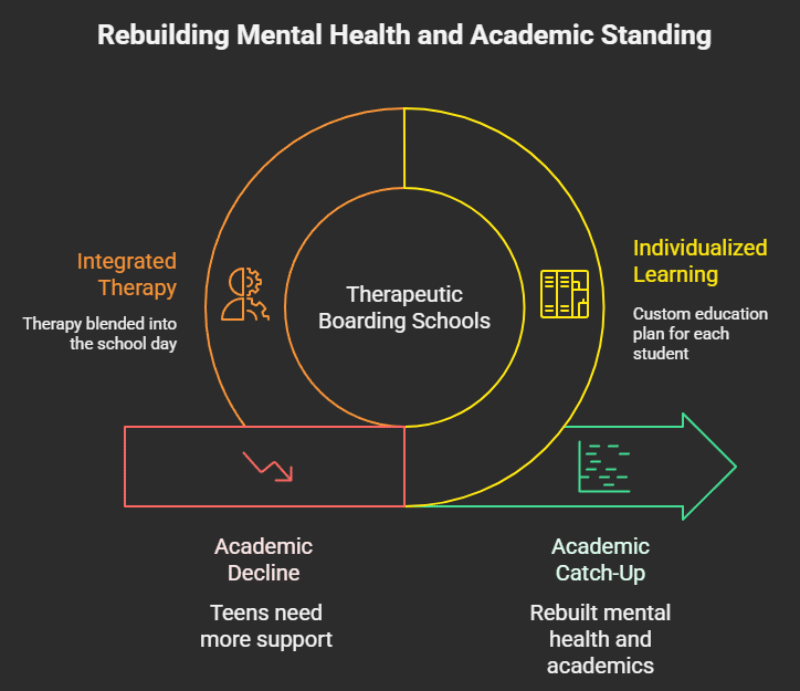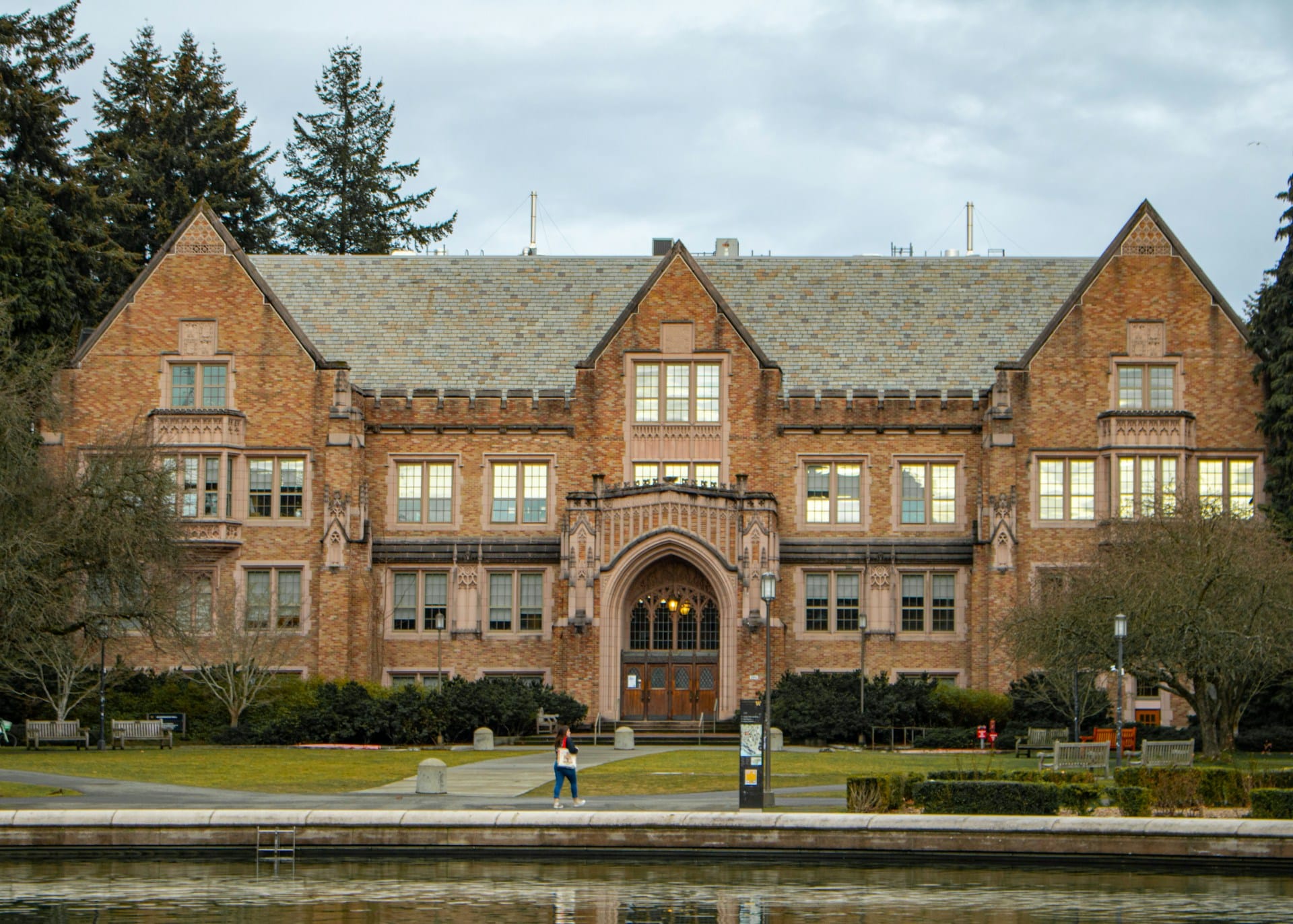When a teen falls behind academically due to emotional, behavioral, or mental health struggles, it can feel like their future is slipping away. But recovery isn’t only about therapy—it’s also about rebuilding confidence in the classroom.
That’s where Therapeutic Boarding Schools for Troubled Teens make a difference. These programs combine mental health treatment with academic recovery, helping students catch up in school while working through emotional challenges.
For families in Utah and across the U.S., therapeutic boarding schools offer a balanced environment where students can heal, learn, and get back on track—academically and personally.
Key Takeaways
- Therapeutic Boarding Schools for Troubled Teens help students heal emotionally and catch up academically.
- Programs use individualized learning plans, small class sizes, and trauma-informed teaching.
- Accreditation ensures credits transfer to other schools or toward graduation.
- Structure and therapy together help rebuild motivation, focus, and responsibility.
- Many schools also offer college prep and life skills training for long-term success.
How Therapeutic Boarding Schools Support Academic Catch-Up
Therapeutic boarding schools are designed for teens who need more than traditional education can provide. Many students arrive after experiencing academic decline due to anxiety, depression, trauma, ADHD, or other behavioral concerns.
Here’s how these programs help them rebuild both their mental health and academic standing:
1. Individualized Learning Plans
Each student starts with a personalized academic assessment. Teachers and therapists work together to create a custom education plan that matches the student’s current level and emotional capacity.
These plans often include:
- Flexible pacing to reduce pressure
- Small classroom sizes for individualized attention
- Credit recovery programs for missed coursework
- Support for learning differences like ADHD or dyslexia
2. Integration of Therapy and Education
Unlike traditional schools, therapeutic programs blend therapy into the school day. A student might attend a math class in the morning, followed by a one-on-one counseling session or group therapy in the afternoon.
This structure ensures emotional stability supports learning—rather than interrupts it.

| Academic Setting | Traditional School | Therapeutic Boarding School |
|---|---|---|
| Class Size | 20–30 students | 6–10 students |
| Emotional Support | Limited counseling | Daily therapy sessions |
| Flexibility | Fixed curriculum | Individualized learning paths |
| Teacher Training | General education | Trauma-informed instruction |
Addressing Learning Gaps and Emotional Barriers
Academic struggles often stem from emotional barriers—like low self-esteem, anxiety, or depression—that affect motivation and concentration.
Therapeutic boarding schools address both sides of the problem:
- Emotional: Through licensed therapy, mindfulness, and behavioral interventions
- Academic: Through structured classes, tutoring, and accountability systems
Students begin to see learning not as a source of stress, but as an opportunity to rebuild their confidence and self-worth.
Accredited Academics: Ensuring Credits Count
Parents often worry: Will my teen’s credits actually transfer?
Most reputable Therapeutic Boarding Schools for Troubled Teens are fully accredited, meaning their credits count toward high school graduation and can transfer to other schools.
Accredited programs meet strict state and national education standards—offering core classes, electives, and even college prep options. Many schools in Utah, for example, are accredited by Cognia or similar education boards.
This ensures your teen can graduate on time—or even early—with a diploma that holds real academic value.
The Role of Structure and Routine
For teens who have struggled with emotional instability, structure is healing. Therapeutic boarding schools emphasize consistent routines:
- Scheduled class times and therapy sessions
- Regular exercise and outdoor activities
- Healthy sleep and nutrition habits
- Screen time and social boundaries
This predictable rhythm helps teens develop executive functioning skills—like organization, accountability, and time management—that will serve them in adulthood.
Academic Catch-Up Beyond High School
Therapeutic boarding schools don’t just focus on graduation—they prepare students for what comes next.
Some programs include:
- College and career counseling
- Internship opportunities for skill-building
- Transition planning for independent living or continued education
At Help Your Teen Now, we often recommend schools that integrate life skills and young adult transition programs—ensuring your teen doesn’t just return home, but returns stronger, more prepared, and more confident.
Why Families Choose Therapeutic Boarding Schools
For parents, the decision to enroll their teen in a therapeutic boarding school is never easy. But when academic decline and emotional distress intertwine, these programs can be life-changing.
Students not only rediscover their love for learning but also gain the tools they need for lasting emotional wellness.
If your teen has fallen behind or feels lost, a therapeutic environment may be the right next step to rebuild both academic success and self-confidence.
Conclusion: Healing Minds, Rebuilding Futures
Helping your teen recover academically means giving them the right support—emotionally and educationally. Therapeutic Boarding Schools for Troubled Teens are designed to do exactly that.
By combining accredited academics, licensed therapy, and compassionate guidance, these programs help students reclaim control of their lives and rediscover their potential.
Contact Help Your Teen Now to help your teen now. Our experienced team can connect you with accredited programs across the country that offer the academic structure and emotional care your teen needs to thrive.






0 Comments